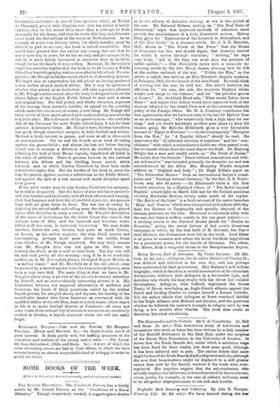SOME BOOKS OF THE WEEK.
as to the efficacy of defensive strategy at sea in this period of the war. Mr. Edmond Holmes, writing on "The Real Basis of Democracy," urges that improved methods of education must precede the establishment of a truly democratic system. Bishop Bury gives his Impressions of the Lammed in Switzerland, and of the Yaer Front," in a pleasant article. Mr. J. A, R. Marriott.
shovrs in "The Power of the Purse" that the House of Commons has lost, and should -regain, that financial control for which it strove through centuries ; "nothing," he says very truly, will in the long run avail SAVO the pressure of public opinion."—The Fortnightly opens with a curiously in- teresting article by the late Henry James, showing how he felt at the sudden outbreak of the war. "Within the Rim," as the article is called, was written, as Miss Elizabeth Asquith explains. in February, 1915, for the benefit of the Arts Fund. He could think of nothing but the war, he told her. The article breathes his affection for "the rare, the sole, the exquisite England whose weight now hangs in the balance," and for "the pricelesa genius of France." Mr. Archibald Hurd asks "What would Nelson have Done " and argues that Nelson would have approved both of the strategy adopted by the Grand Fleet and of the cautious blockade policy of the Foreign Office. Mr. W. L. Courtney contributes the best appreciation that we have yet seen of the late Sir Herbert Tree as an actor-manager, "who consistently held a high ideal for our stags" and yet would knowingly produce poor playa to keep his theatre going. Sir Malcolm McBa-raith givee a very favourable account of "Egypt in Wartime."—In the Contemporary "Thoughts from the War," by "A Regular Officer," should be read. Ha deprecates the "ill-informed criticism of superiors" and the " non- chalance " with which a subordinate's faults are often passed over, but he cannot refrain from the usual digs at the Staff. Dr. Haglyerg Wright leas a sane and candid article on "The Trials of Russia." He insists that the formula "Peace without annexations and with- out indemnities" was intended primarily for domestic use and was misunderstood by the Allies. Mrs. Humphry Ward's eloquent address on "England and Italy " ; Dr. Hugh Ballot's paper on " Tho Submarine Menace" from an international lawyer's stand- point; and Theology without Germany," by the Rev. E. S. Water- house, may also be noted.—In Blackwood'a there is the firat detailed narrative, by a Highland officer, of "The Battle beyond Bagdad," shard fight on March 15th last for the Turkish positions covering Mushaidie Station, twenty miles north of the capital_ "The Battle of the Lake " is a lively account of the motor-launches 'Mimi ' and ' Toutou 'which were transported with infinite difficulty from the Thames to Tanganyika and speedily disposed of the German gunboats on the lake. Blackwood is concerned solely with the war, but there is endless variety in the one great subject.— A striking article in the National Review pleads for "Justice to Rumania," giving the secret history of last year's disastrous campaign, in which, by the bad faith of M. Stormer, the Tsar's chief Minister, the Rumanians were left in the lurch. Lord Esher is at pains to examine and refute the latest Paeificist suggestions for a premature peace, for the benefit of Germany. The editor. Mr. Masse, finds a congenial theme in the Mesopotamian Report.


























 Previous page
Previous page